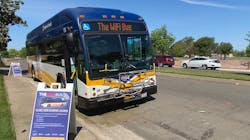California Transportation Agency, city of Sacramento, SacRT launch Wi-Fi bus
The Sacramento Regional Transit District (SacRT) is partnering with the California State Transportation Agency and the city of Sacramento to turn buses into free hotspots for communities with limited high-speed internet access during the COVID-19 pandemic.
Testing for the 60-day proof of concept began May 1, with the first three Wi-Fi buses going live May 4, to promote opportunities for distance learning, telework and telehealth. Seven additional buses will be deployed to more “digital desert” communities across Sacramento beginning the week of May 11. Buses will provide three and a half hours of wireless broadband service at two locations each day, with updated schedules available at thewifibus.com.
The 10 repurposed Wi-Fi buses are outfitted with combinations of equipment provided free of charge by proof of concept partners AT&T, Verizon Wireless, T-Mobile, Cradlepoint, Sierra Wireless and Aruba, a Hewlett Packard Enterprise company, to offer high-speed connectivity with a range of up to 1,800 feet.
Hotspot locations and protocols will be determined in collaboration between the city of Sacramento, Valley Vision, Sacramento Public Library, SacRT, the California State Transportation Agency and public health officials. High-need locations will be selected with input from local school districts, community organizations and digital divide research, as well as the ability for users to maintain physical distancing and follow public health guidelines. The Sacramento Public Library will provide bus parking at its branches and online resources for students to access when connected to the Wi-Fi bus network.
California Gov. Gavin Newsom announced the project on April 20 as part of the state’s efforts to support distance learning and close the digital divide during the COVID-19 pandemic. Approximately one in five students in California lack high-speed internet access and nearly half of all low-income households in the state do not have broadband service at home.
“We’re excited to launch this innovative Wi-Fi bus project to help close the digital divide and provide vital high-speed internet services to our communities,” said California State Transportation Agency Secretary David S. Kim. “Using transit buses to deliver broadband connectivity is creativity at its very best, and I want to thank [Sacramento] Mayor [Darrell] Steinberg and the city of Sacramento, [SacRT General Manager/CEO] Henry Li and SacRT, the Sacramento Public Library, and our private sector partners for making this project a reality.”
Mayor Steinberg says the buses are an important innovation to enable more children to participate in distance learning while out of the classroom.
“These mobile Wi-Fi bus hotspots will help remedy the lack of internet access that threatens to leave thousands of our students farther behind. I thank all of the partners who worked to make this happen, and I hope to see it replicated on a larger scale around California.”
“We are proud to be able to use our buses to help kids across the Sacramento region get the internet connection they need to continue their education through distance learning,” said Li. “I’m pleased that SacRT is still able to contribute to closing the achievement gap whether it’s through free Wi-Fi enabled buses or fare-free transit.”
Schedules and locations between May 4 and Friday, May 8 are available at thewifibus.com. Starting May 11, the Wi-Fi bus will be available seven days a week.



